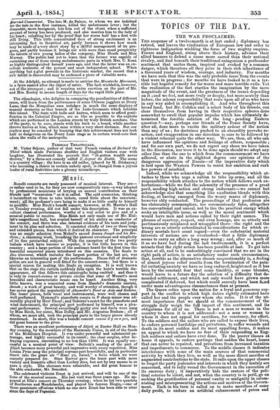3I1 usu.
Benefit concerts are rarely possessed of musical interest. They are— or rather used to be, for they are now comparatively rare—a way adopted 'by professional musicians of levying an annual contribution on their friends and "'connexion" as it is called. The said connexion, thinking it incumbent on them to take tickets, cared little about the entertain- ment; all the professor's care being to make it as little costly to himself
posiible. Miss Birch's benefit conceit, however, at St Martin's Hall on Tuesday evening, did not fall under this description. It was an ex- cellent classical- performance, worthy of a real artist to give and of a musical public to receive. Miss Birch, not only made use of Mr. Hul- lah's magnificent hall, but availed herself of his ability as conductor of the concert, and there was also internal evidence of his taste and judg- ment in its plan and selection. It consisted chiefly of two or three large -and extended pieces, from which it derived its character. The principal was an ample selection from Mehul's sacred drama Joseph and his Bre- thren, ; a charming work, breathing the Pastoral sweetness and simplicity of its fine patriarchal subject With the exception of the two pretty ballads which have become so popular, it is but little known in this country ; and a large portion of the audience heard for the first time the beautiful concerted pieces introduced on this occasion. The finale to Don Giovanni, which includes the largest portion of the last act, was likewise an interesting part of the performance. Pieces full of dramatic action are not in general well fitted for the concert room, • but there is a special reason for making this finale , an exception. It is well known that on the stage the curtain suddenly falls upon the hero's terrible dis- appearance, all that follows this catastrophe being omitted : and thus it only in concert-rooma or private circles that• some of Mozart's most beautiful and characteristic music can be heard. Another thing, very little known, was a concerted scene from Handers dramatic cantata, .Semele ; a work of great beauty, and well worthy of attention tlioagh it has never gained the popularity of Alexander's Feast or ...4.(s mid Galatea. The lesser pieces, both vocal and instrumental, were -well chosen and well perfonned. -Hummel'a pianoforte sonata in F sharp minor was ad- mirably played by Herr Feuer ; and-OsliOrne's sestet for the pianoforte and wind instruments, the principal part performed by himself, was a plea- sant performance. Several exceedingly pretty airs and duets were sung by Miss Birch, her sister, Miss Dolby, and Mr. Augustus Braham ' - all of whom, we _must add, toil the principal parts in the larger pieces already
• mentioned. In short, this was a benefit concert comma IIy en a pen, and did great honour to the giver.
There was an excellent performance of Elijah at Exeter Hall on Mon- day evening, by the members of the Harmonic Union, in aid of the funds of t,he Middlesex Hospital. It was under 'powerful and substantial pa- tronage, and highly successful in its result; the clear surplus, after de- fraying expenses, amounting to no less than 1200/. It was equally suc- cessful in a musical point of 'view. Belletti's reading of the part of Elijah becomes more powerful and impressive with every repetition. Miss Louisa Pyne sang the principal sopraho part beautifully, and in particular threw into the greet air Hear. ye, Israel," a force which we were scarcely prepared for. Sims Reeves' gave the tenor part with more variety and dramatic effect than Lockey does, but not by any means in so pure a style. The choruses were admirable, and did great honour to the able conductor, Mr. Benedict.
The celebrated violinist Ernst is just arrived, and will be one of the lions of the musical season. His last visit was three years ago. He ap- peared at Ella's concert on Thursday evening; when he led two quartets of Beethoven and Mendelasohn, and played his famous Elegie,—one of those passionate effusions which no one save Ernst has been able to utter ainee the days of Paganini.


































 Previous page
Previous page